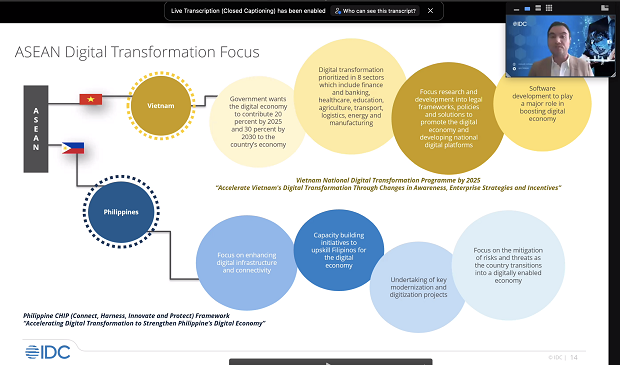In a media briefing on Wednesday, June 15, analyst firm IDC revealed that Southeast Asian (SEA) digital-first economies may develop slower than what Asean governments expect due to lack of long-term planning, insufficient government support, and limited cross-industry collaboration.

IDC defines a digital-first economy as one where the production and consumption of digital products, services, and experiences accounts for at least 65% of GDP. Individual Asean businesses have stepped up their digital transformation journeys due to the pandemic and these organizations have a pivotal role in contributing to their nation’s digital economies.
“If you look at countries and no matter what their aspirations are for Indonesia, Malaysia, the Philippines, Thailand around the digital economy, the ultimate enabler in growth of digital economies is going to be the enterprises,” said Sudev Bangah, IDC Asean managing director and the lead analyst who headed the briefing.
In 2021, IDC observed that Asean enterprises responded to the Covid-19 by investing in digital transformation to improve their business agility and resilience as well as reduce their business risk. This thrust towards digitalization was not confined to large enterprises as 86% of Asean SMEs accelerated their digitalization due to Covid’s disruptive effects.
Despite strides in businesses’ digitalization journeys, however, IDC reported that 76% of Asean organizations’ digital transformation plans focus solely on the short-term. Only 8.6% of Asean businesses have a long-term investment plan to transform markets through digital technologies. The firm stated that this view will hamper SEA’s progress towards digital-first economies and subsequently, it recommended that organizations craft longer-term strategies.
Yet, while enterprises are key players, IDC emphasized that building a digital-first economy is not the work of businesses alone. Governments in particular must adapt to support their digital economies growth.
“There are many instances where sectors have not revised a lot of their policies over a 15- to 20-year period in fact. This caused them to be a little bit slow in terms of adopting technology and the clarity around wanting to adopt infrastructure modernization projects,” explained Bangah.
Asean governments are moving to address these restrictive policies after the pandemic’s lockdowns. Especially in the last six months, IDC has observed that governments have revised their digital economy roadmaps. The company advises Asean governments to integrate a holistic view of the digital economy into their plans.
Taking a holistic view requires governments to widen their focus beyond heightening productivity through ICT. They must think ahead and anticipate the technologies that will be the focus of their economies in the next five to ten years, improve the flexibility of their policies, address cybersecurity threats and privacy risks, educate and upskill citizens as well as their ensure employment, and build digital infrastructure.
Regarding the Philippines, improving the country’s digital infrastructure is at the forefront of the government’s digital economy roadmap. IDC said this activity is a good first step, but more needs to be done for the country to secure a digital economy.
Bangah recommends that the Philippines prioritize capacity-building. This activity includes change management to teach Filipinos how to use the digital technologies available to them and applying relevant KPIs in assessing the performance of e-government platforms from user and productivity standpoints.
Lastly, to build a digital-first economy, cross industry collaboration is a necessity. IDC urged enterprises to involve all sectors in their long-term strategy to build a digital first economy.
Bangah expounded: “The government isn’t the only cog in the wheel. When we move into innovation, when you talk about supply chains, when you talk about delivery and the creation of products in the digital economy, that includes everyone from a start-up, all the way to a payment provider, all the way to supply chain partners and all the way to even academia.”
“That entire circle is very, very important for enterprises to be a part of because we feel strongly this is what ultimately helps contribute to the digital first economy,” he stated.




